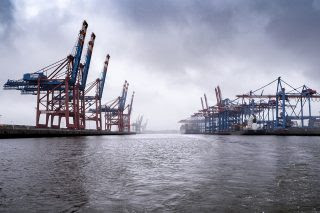The
German government is launching a set of measures to promote shore-generated
power in an effort to make the country’s ports cleaner.
German government is launching a set of measures to promote shore-generated
power in an effort to make the country’s ports cleaner.
Instead
of burning fossil fuels to generate shipboard electric power, vessels in
Germany’s ports will be using renewable shore-based energy in the future.
of burning fossil fuels to generate shipboard electric power, vessels in
Germany’s ports will be using renewable shore-based energy in the future.
Government
representatives of several regions in Germany met in Kiel on October 10 and
signed a memorandum of understanding listing the conditions for the use of
shore-generated power to provide cleaner air in port cities.
representatives of several regions in Germany met in Kiel on October 10 and
signed a memorandum of understanding listing the conditions for the use of
shore-generated power to provide cleaner air in port cities.
“With
these measures, we are making a significant contribution towards cleaner air
and a reduction of CO2 and noise in port cities along the North Sea and Baltic
coasts. We are also giving ports and shipowners planning certainty for
expanding facilities and refitting ships,” Peter Altmeier, Federal Minister for
Economic Affairs and Energy, commented.
these measures, we are making a significant contribution towards cleaner air
and a reduction of CO2 and noise in port cities along the North Sea and Baltic
coasts. We are also giving ports and shipowners planning certainty for
expanding facilities and refitting ships,” Peter Altmeier, Federal Minister for
Economic Affairs and Energy, commented.
“Shore-based
power supply as an alternative to operating shipboard diesels represents a
tangible contribution towards cleaner air and protecting the climate. That
applies to the port in Kiel and all other port cities on the North Sea and
Baltic,” Daniel Günther, Minister-President for Land Schleswig-Holstein, said.
power supply as an alternative to operating shipboard diesels represents a
tangible contribution towards cleaner air and protecting the climate. That
applies to the port in Kiel and all other port cities on the North Sea and
Baltic,” Daniel Günther, Minister-President for Land Schleswig-Holstein, said.
“The
memorandum is an initial, important step towards improving the commercial
viability of shore-based power. The paper includes the reduction of the EU levy
to 20 percent favoured by Schleswig-Holstein. By mid-2020 we should have
initiated the essential legal steps. I am expecting rapid implementation of
what we have agreed.”
memorandum is an initial, important step towards improving the commercial
viability of shore-based power. The paper includes the reduction of the EU levy
to 20 percent favoured by Schleswig-Holstein. By mid-2020 we should have
initiated the essential legal steps. I am expecting rapid implementation of
what we have agreed.”
The
use of shore-based power derived from renewable energy sources can
substantially reduce emissions from ships during lay times in German seaports.
However, since the costs are too high compared to those for power supply from
the conventional sources, there is currently barely any demand for it from
shipowners.
use of shore-based power derived from renewable energy sources can
substantially reduce emissions from ships during lay times in German seaports.
However, since the costs are too high compared to those for power supply from
the conventional sources, there is currently barely any demand for it from
shipowners.
Among
other things, the package of measures provides for rulings that make a start on
reducing levies, as well as special network charges, for cruise liners, ferries
and containerships. Compared to inland shipping, seagoing ships have to reckon
with distinctly higher costs, since they consume considerably more electricity
during longer port lay times. They can currently only secure supply on the
basis of extremely unfavorable consumer profiles.
other things, the package of measures provides for rulings that make a start on
reducing levies, as well as special network charges, for cruise liners, ferries
and containerships. Compared to inland shipping, seagoing ships have to reckon
with distinctly higher costs, since they consume considerably more electricity
during longer port lay times. They can currently only secure supply on the
basis of extremely unfavorable consumer profiles.
At
the same time, a program of subsidies totaling EUR 140 million (about USD 155
million) should be in place from 2020 to assist states and ports in expanding
essential port infrastructure.
the same time, a program of subsidies totaling EUR 140 million (about USD 155
million) should be in place from 2020 to assist states and ports in expanding
essential port infrastructure.
Hamburg,
Kiel and Rostock seaports are already planning far-reaching expansion. In May
this year, Kiel inaugurated its first shore-based power supply plant for ships
that would enable the port to supply more than half of ships berthing in the
port.
Kiel and Rostock seaports are already planning far-reaching expansion. In May
this year, Kiel inaugurated its first shore-based power supply plant for ships
that would enable the port to supply more than half of ships berthing in the
port.
As
explained, the newly announced measures should enable such units to be operated
on a commercial basis.
explained, the newly announced measures should enable such units to be operated
on a commercial basis.
In
separate statements, German cruise companies TUI Cruises and AIDA Cruises
welcomed the latest governmental incentive scheme for shore-generated power. The
program is said to be in line with strategies of both cruise lines which are
aimed at reducing emissions in cruising.
separate statements, German cruise companies TUI Cruises and AIDA Cruises
welcomed the latest governmental incentive scheme for shore-generated power. The
program is said to be in line with strategies of both cruise lines which are
aimed at reducing emissions in cruising.
World Maritime News

